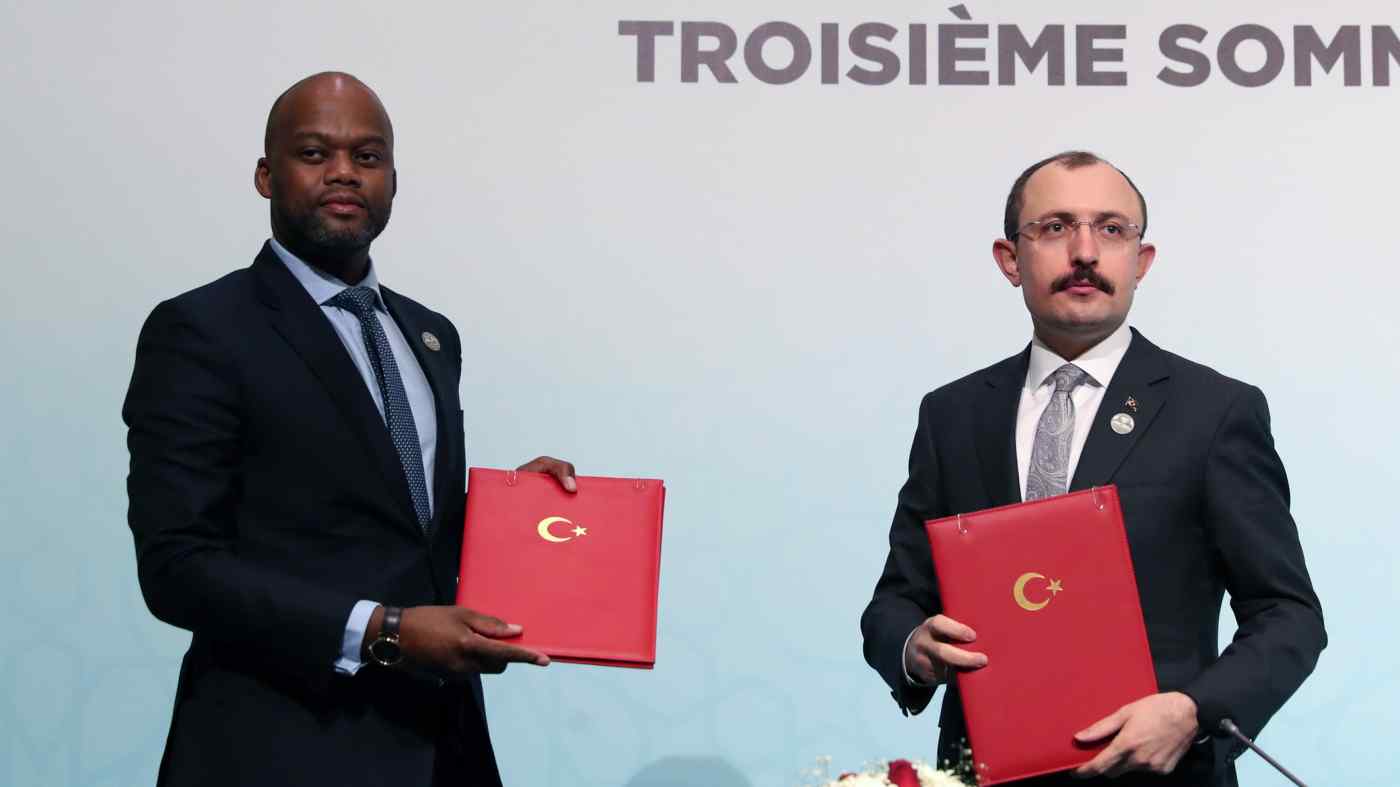The secretary-general of the African Continental Free Trade Area wants Asian investors to seize the opportunity offered by the continent’s 1.3 billion people and $3.4 trillion economic bloc.
Wamkele Mene of South Africa attended the third Turkey-Africa Partnership Summit in Istanbul, where he sat down with Nikkei Asia for an interview Saturday. From Africa, 16 heads of state and more than 100 ministers attended the summit.
The AfCFTA agreement, forming the largest such zone by number of countries since the creation of the World Trade Organization, came into force in May 2019, and the bloc began trade on Jan. 1, according to Mene.
Mene said 39 of the 54 signatory African countries have completed the formal process to join the group.
“Our intention is to reduce barriers for intra-Africa trade and investment to ensure that we accelerate African industrialization by value-added production,” he said, adding that the bloc aims to shift African nations from trading mainly with Europe toward regional trade within Africa.
Intra-Africa trade stands at 15% of the continent’s total, compared with about 70% for Europe and around 60% in Asia, according to United Nations Conference on Trade and Development 2019 data
AfCFTA is “like a comprehensive economic partnership agreement, except the difference is this has very strong development components to it” and covers a “wide range of sectors like construction services, distribution, transport as well as financial services,” Mene said.
The secretary-general signed a memorandum of understanding with Turkish Trade Minister Mehmet Mus on the sidelines of the summit regarding cooperation toward accelerating trade and investment between Turkey and African countries.
Mene noted the already “phenomenal improvement on trade data” between Turkey and African countries, as trade volume rose to $25 billion in 2020 from $5 billion in 2003.
Turkish President Recep Tayyip Erdogan said during the summit that Turkey has invested more than $6 billion in Africa and employs 25,000 people, with Turkish contractors completing 1,686 projects worth a total of $78 billion.
“That trade increase happened in the absence of any formal cooperation arrangement,” Mene said. “Now that we have a formal cooperation arrangement, I believe we have an opportunity to double” the trade to $50 billion quickly.
Erdogan said trade volume between Turkey and African countries has reached $30 billion in the first 11 months of this year, already a record, despite the coronavirus pandemic.
“Turkey has no colonial baggage,” Mene said. “It does not look down on anybody in Africa and looks at us as equals and partners. And that’s important from a political perspective, and that’s why so many countries here are fully supportive of Turkey’s relations with Africa.”
Mene suggested that Africa contains many investment opportunities for Turkish companies in manufacturing, construction and the service sector.
Felix Tshisekedi, president of the Democratic Republic of Congo and current chair of the African Union, said at the Istanbul summit that Africa has much to do in the infrastructure sector.
“We have established an Africa continental free trade area, and for that, we need better connectivity,” he said, urging Turkish support for infrastructure projects like ports.
But Mene noted that the AfCFTA trade bloc itself is focused on African member states.
“We are not yet in a position to negotiate with third countries [for free trade deals],” the secretary-general said. “What we are doing is to consolidate our own intra-Africa market and make it competitive so that those who are investing can see returns on their investment.”
Yet any investment in an AfCFTA country will “provide access to entire continent,” he said.
Africa held six of the 10 fastest-growing countries economically in 2019, before the coronavirus pandemic, while the continent grew 3.5% that year, Mene said.
“So, certainly, there is dynamism in Africa,” he said. “Africa is a compelling investment destination.”
Mene discussed last month’s Forum on China-Africa Cooperation, saying no specific talk about AfCFTA occurred at the ministerial-level meeting. “I expect maybe that would come up when heads of states meet in about a year’s time,” he said.
“AfCFTA will enable the African continent to consolidate its position with respect to trade with the rest of the world,” he said. “That’s really the key. It is not so much how we are positioning China, [the European Union and others] against the other. It is more an issue on how we consolidate our market for global competitiveness.”
Regarding Japan, the AfCFTA bloc offers a chance to scale up the already “significant amount of Japanese investment in Africa,” Mene said.
Read original story on NIKKEI Asia

